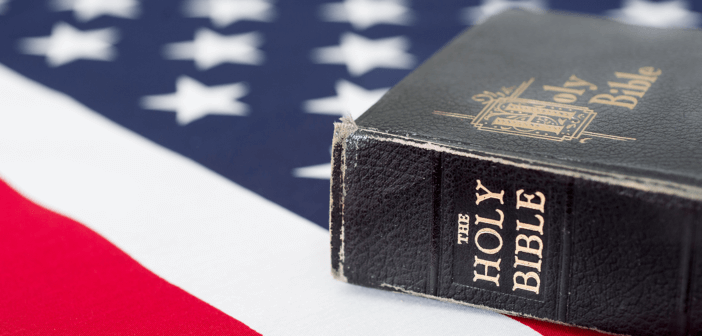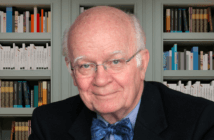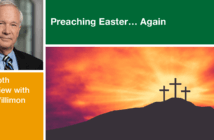Lovett H. Weems Jr. writes that preaching at the time of a national holiday offers opportunities and dangers. He says it is important to approach the holiday theme through the lens of biblical faith, especially in today’s deeply polarized political climate.
National holidays and celebrations offer both opportunities and dangers for congregations and their leaders. Preachers and worship leaders often feel the tension between conflicting options. One possibility is to ignore the national holiday completely when it has no special Christian significance. Another is a temptation to have a holiday theme for worship with little connection to Scripture and the One we know as the God of all nations and peoples.
Instead of looking at worship and preaching around national holidays through the lens of the holiday, another approach is to look at the holiday theme through the lens of biblical faith. It is a form of reframing that leaders often must do to be faithful and effective. We affirm a common value, in this case a national celebration, and reinterpret its meaning from a biblical perspective.
As we read the stories of people in once powerful nations in biblical times and ever since, we are often struck by how they would have benefited from a perspective rooted in faith in God who cares for all people, instead of a perspective limited to the interests of the nation. Instead of shaping faith to conform to nation, there is much that nations, including our own, can learn from the lessons of Scripture. The “bringing down of the powerful from their thrones” and “lifting up the lowly” (Luke 1:52) is a warning for all nations who exhibit little interest in God’s hopes for all citizens and all the world.
Strong nations such as ours do well to remember Ezekiel likening a once great nation to a cedar whose fair branches overshadowed the forest. It grew taller than every other tree. No cedar in God’s garden overshadowed it, and no fir could compare with its boughs. Not a tree in God’s garden could rival its beauty. But the eminence of the giant cedar tempted it to forget that it was the waters beneath it that made it great (Ezekiel 31:4).
All Christians face a struggle around the tension between loyalty to country and to God. Our faith says that loyalty to God should occupy first place in our lives. And yet, many voices imply that we are something less than patriotic if our ultimate allegiance is not to our own country.
The Bible illustrates that a primary loyalty to country has been a perennial temptation for all people, including people of faith. Although the Bible warns against making a god of one’s nation, this form of nationalism continues to be a tempting alternative to radical allegiance to God.
Today’s deeply polarized political climate makes the challenge of this tension between nation and faith even more pressing. Secular rulers have always sought to surround themselves with religious leaders who give their blessing. Billy Graham learned painfully how powerful leaders can betray one’s trust and values. So, the fact that the current president surrounds himself with what historian John Fea of Messiah College calls “court evangelicals” surprises no one steeped in the Bible. Christians understand that God’s truth does not lie with the agenda of any political party. All positions need thoughtful affirmation and critique based on how these policies align with God’s hopes for all humankind.
Thomas Jefferson once wrote, “I tremble for my country when I reflect that God is just.” Indeed, we all should tremble. But we should do more. We are called to thank God for faithful men and women of every generation who understand that a nation’s strength rests more in faithful inward purpose than in outward power and possessions. As we enjoy the Fourth of July, let us remember that we worship a God who reigns over all nations and systems and let us ask for vision to bless and to judge based on the more excellent way to which most nations aspire but never completely achieve.
Related Resources
- Leading in an Age of Political Polarization by David R. Brubaker
- What Does Religious Freedom Mean Today? by Lovett H. Weems, Jr.
- 4 Tips for Preaching on Politically Charged Topics by Ginger Gaines-Cirelli






